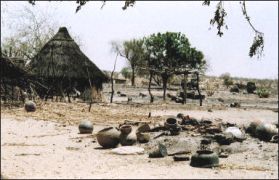US survey points to victims in Sudan’s Darfur
By ELLEN KNICKMEYER, Associated Press Writer
DAKAR, Senegal, Jan 20, 2005 (AP) — Although the commonly cited estimates of the death toll in Sudan’s Darfur region refer to fatalities from disease and hunger, analysis of a recent U.S.-commissioned survey strongly suggests that many thousands – at a minimum – have been killed in violence as well.
 The conclusion is based on a survey conducted for U.S. Secretary of State Colin Powell in July and August, a month before he declared that Darfur’s killing represented genocide. Analysis of that survey continues, officials say, even as the U.N. Security Council awaits results of its separate investigation into the conflict this month.
The conclusion is based on a survey conducted for U.S. Secretary of State Colin Powell in July and August, a month before he declared that Darfur’s killing represented genocide. Analysis of that survey continues, officials say, even as the U.N. Security Council awaits results of its separate investigation into the conflict this month.
The U.S.-commissioned study interviewed 1,136 refugees who had fled Darfur for U.N. tent cities and camps along Chad’s eastern border, selecting them through a random method meant to yield a sample representative at least of the 200,000 Darfur refugees in Chad.
The key finding: 61 percent said they had seen a family member killed before their eyes in violence blamed on Sudanese forces and government-backed Arab militias accused of a scorched-earth campaign against African villagers.
Fritz Scheuren, president of the American Statistical Associations, said the survey methods were correct, and Juan Mendez, the U.N. envoy for the prevention of genocide, called it comprehensive. Smith College professor Eric Reeves, a researcher into the conflict, said if the figure held for all of Darfur’s 2 million displaced the implication would be 200,000 killed.
However, there is no certainty that the experiences of the displaced in Chad – the group the sample came from – are the same as those of other refugees who did not reach Chad, or of all of the 6 million people of Darfur.
Furthermore, projecting a precise death toll estimate from the survey is problematic because there is no certainty about the size of the group each refugee would consider to be “family” – a key element in the calculation. Refugees included extended family – such as uncles and cousins – in their answers, said Stefanie Frease of the Washington, D.C.-based nonprofit Coalition for International Justice, which conducted the survey with the U.S. State Department.
There is, however, widespread consensus that the findings indicate the death toll from violence to be in the many thousands.
Until now, the most widely circulated Darfur-related toll has been a World Health Organization estimate that 70,000 had died from its indirect effects – chiefly disease and hunger – in an eight-month stretch in 2004.
The survey also shows a consistent pattern of coordinated killings by Sudanese forces and allied Arab militia targeting non-Arab villagers, said Frease, whose group has aided war-crimes trials in the former Yugoslavia.
Refugees spoke of attacks timed to maximize civilian casualties, of attackers pledging to purge Darfur of its non-Arab black majority, and of mass burials of victims. Refugees questioned for the survey spoke of air- and ground attacks on market days and or to coincide with other events that would draw large numbers of civilians.
“We will kill all the men and rape the women. We want to change the color” of the people, a male refugee questioned for the survey quoted an attacker saying about a December 2003 government and tribal raid on his village of Refeda.
Sudan’s Arab-dominated central government has denied targeting Darfur civilians or allying with Arab militias, and officials did not respond to requests about the survey. Sudan has also blocked most outside access to the government-controlled Darfur countryside until last summer, making direct investigation of the carnage impossible.
The United States has been a lead proponent of action against Sudan for the near 2-year-old unrest in Darfur, which has emptied more than 400 villages. Some have urged U.N. sanctions or war-crimes trials for Sudanese leaders.
The Security Council-commissioned probe – whose release is expected within days or weeks – is expected to deliver more authoritative evidence on whether Darfur’s killing constitutes genocide.
Survey teams gathered the names of thousands of slain. Surveyers asked interview subjects to give the names, ages and other details of every family member they reported they had seen killed, Frease said. “In some cases, we have lists of 20 people from one witness,” Frease said.
Sudan, meanwhile, has pointed to the fact no mass graves have been found to bolster its case that any death toll is low.
But refugee accounts to survey teams suggest the graves are there to be uncovered. At the village of Agurnrd, a village man helped dig the graves of 52 men executed at point-blank range by Arab militia fighters in a mix of civilian and military uniforms in April 2004, he told researchers.
